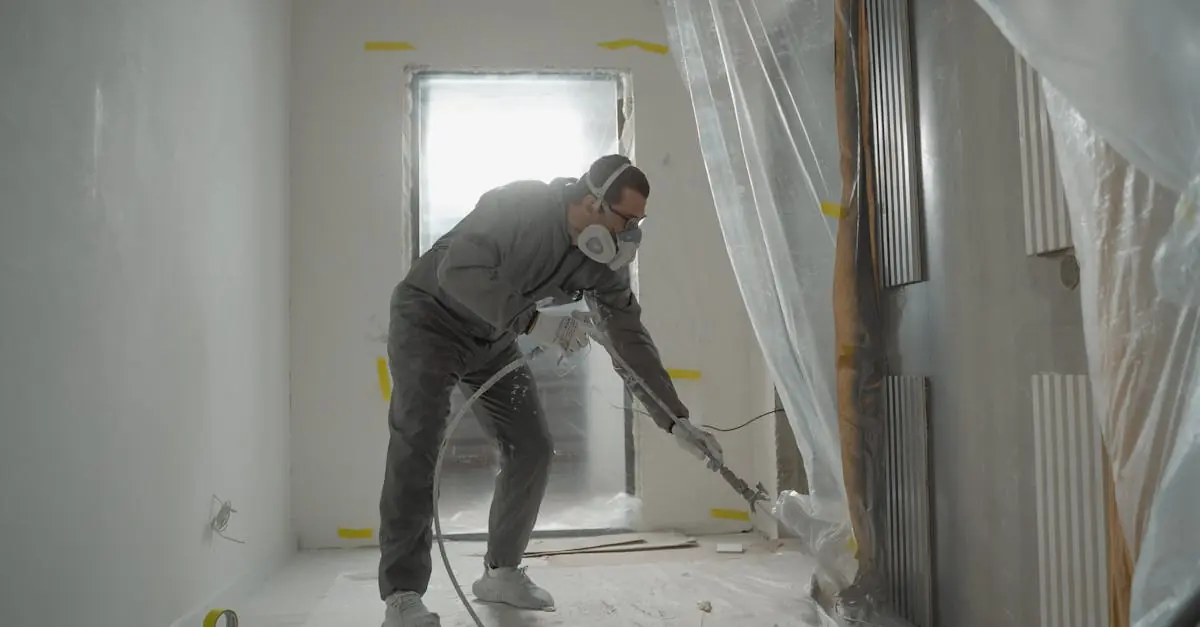Table of Contents
ToggleEver dreamt of living for free while your house pays you? Welcome to the world of house hacking, where savvy homeowners turn their properties into profit-generating machines. With a clever house hacking business plan, anyone can transform a simple abode into a financial powerhouse. It’s like having a roommate who pays rent but doesn’t eat your snacks!
Understanding House Hacking
House hacking transforms a homeowner’s living situation into a potential source of income. This strategy enables individuals to offset mortgage costs while maximizing property value.
What Is House Hacking?
House hacking refers to the practice of renting out a portion of a primary residence to generate income. Owners can choose to rent a spare room, basement apartment, or even an entire unit in multi-family properties. Potential tenants can be long-term renters or short-term guests through platforms like Airbnb. This arrangement allows homeowners to minimize housing expenses while retaining their living space.
Benefits of House Hacking
Financial benefits include decreased mortgage payments and the possibility of building equity faster. Cash flow from tenants can cover living expenses, allowing homeowners to invest in other ventures. Additionally, house hacking offers companionship, enhancing social interaction. Tax advantages exist, too, through deductible expenses related to the rented space. Long-term, increased property value often follows property upgrades driven by rental income.
Creating a House Hacking Business Plan
Developing a house hacking business plan involves careful consideration of key elements that can maximize profitability. Identify the right approach to transform a property into an income source.
Identifying Your Niche
Start by assessing the local rental market. Understand the demand for long-term tenants versus short-term guests, such as those using Airbnb. Each option attracts different audiences; thus, knowing the target market is crucial. Pair unique features of the property with the right rental strategy. Consider preferences such as pet policies or furnished accommodations, as these factors can influence rental decisions. Tailor marketing efforts to highlight amenities that resonate with potential renters.
Financial Considerations
Evaluate startup costs and ongoing expenses. Include renovations, utilities, and property management fees in the budget. Create a spreadsheet to track income from rentals and determine return on investment. Calculate rental rates based on local market trends, ensuring they align with financial goals. Reserve a portion of rental income for unexpected repairs or vacancies. Secure financing options that accommodate living and investment needs, optimizing for both cash flow and long-term profitability.
Legal Requirements
Research local laws regarding renting out part of a property. Compliance with zoning regulations is essential to ensure legality. Obtain necessary permits and licenses before renting. Specific rules may vary significantly between jurisdictions, so checking state and local guidelines is necessary. Familiarize with tenant rights and lease agreements, as this knowledge protects both the homeowner and renters. Ensure any rental arrangement adheres to safety and health standards, as these factors contribute to successful house hacking.
Strategies for Successful House Hacking
Implementing effective strategies is essential for successful house hacking. The right approaches can maximize income and streamline operations.
Property Selection
Choosing the right property significantly affects house hacking success. He or she should consider various factors, such as location, size, and layout. Areas near public transportation or universities attract long-term renters. Alternatively, properties with separate entrances or units are ideal for short-term rentals. Proximity to amenities enhances appeal and can lead to higher rental rates. Regular maintenance also plays a crucial role in retaining tenants, as well-kept properties attract quality renters.
Financing Options
Exploring financing options can ensure a successful house hacking venture. Various methods exist to acquire funding, including conventional loans and FHA loans, which allow lower down payments for owner-occupied properties. Investors may also consider using home equity lines of credit to access cash for renovations. Additionally, local grants or assistance programs might provide support for first-time homebuyers. Understanding interest rates and repayment terms helps in selecting a suitable option. Careful financial planning ensures that rental income covers mortgage costs while maximizing profitability.
Marketing Your Space
Effective marketing is vital for attracting renters. Highlighting property features in listings increases visibility and interest. Utilize online platforms such as Zillow, Craigslist, or Airbnb to reach potential tenants. Great photographs and engaging descriptions enhance online presence. Hosting open houses can also draw attention to the property. Encouraging positive reviews from past tenants boosts credibility and attracts new renters. Utilizing social media further broadens the reach, connecting with a wider audience. Every marketing effort should aim to convey the unique benefits of the rental space.
Common Challenges in House Hacking
House hacking presents several challenges that owners must navigate. Understanding these hurdles helps ensure a smoother experience.
Managing Tenants
Managing tenants can be complex. Communication plays a crucial role in building good relationships. Homeowners should establish clear expectations upfront to minimize conflicts. Timely response to tenant requests fosters trust and satisfaction. Background checks can identify reliable renters, reducing potential issues. Rent collection also requires an organized approach; late payment strategies should be clearly defined. Conflict resolution skills come in handy when disputes arise, helping maintain a harmonious environment.
Maintenance and Upkeep
Maintenance and upkeep are ongoing responsibilities. Property owners must allocate time and resources effectively. Regular inspections help identify issues before they escalate, saving money in the long run. Tenants should understand their responsibilities regarding minor repairs. Homeowners can create a maintenance schedule to ensure important tasks aren’t overlooked. Hiring professional services for significant repairs ensures quality work, while their expertise minimizes risks. Effective upkeep enhances property appeal, attracting potential renters and retaining current ones.
Conclusion
House hacking offers a unique opportunity for homeowners to transform their properties into profitable ventures. By implementing a solid business plan and understanding the local market, individuals can effectively generate income while enjoying the benefits of shared living.
Navigating the challenges of tenant management and property maintenance is essential for success. With careful planning and strategic marketing, homeowners can maximize their rental income and enhance their property’s value over time. Embracing house hacking not only alleviates financial burdens but also fosters a sense of community, making it a rewarding choice for many.








